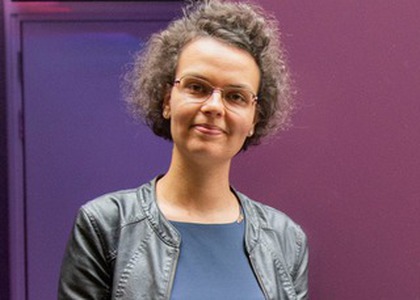> Interviews

Interview with Raluca Matei about the conference "The well-being and health of musicians: to where and how?"
On Monday, May 29th, starting at 7 p.m., at the National University of Music in Bucharest there is a conference entitled "The well-being and health of musicians: to where and how?" We learn more about this conference from Raluca Matei, a psychologist specializing in the health and well-being of musicians, consultant and researcher in the UK, who will provide the public with some preliminary results from her latest research in the field.
I'd like to talk a little bit first about the research process. What exactly does it entail and how does it play out?
It assumes, first of all, curiosity: having a research question to be interested in, and then you need a lot of patience to go through all the necessary steps. Depending on the methodology you have chosen, it can be rather qualitative, means that you can be more concerned with people's vision, in such a way that you talk to them, do interviews and analyze their words, their speech ; or you can embrace a more quantitative methodology and then look at numbers, statistics, and more concrete data. Then follows the process of writing that article, interpreting the data, and publishing it.
What was your starting point when you chose to study this issue?
We started from a fairly broad research question, namely what do we know about the health of musicians and how can we improve it, if there are some problems. And from there, probably started more specific questions: how can we offer them health education programs? What exactly is happening among students at the Conservatory, why do they go to psychological counseling? What are the reasons for doing this? What they know about prevention in general or simply how they see their own health and well-being.
What can the public expect to at the conference?
I will start by presenting some general data from the specialized literature regarding the health and well-being of musicians internationally, then I will focus on a very specific project that I have made in Romania, which involved a series of 43 interviews with students from five conservatories in Romania, during which I simply asked them how they see their health and well-being and what they think are the factors that facilitate an optimal well-being or the barriers, in this sense. My participants have a very holistic view of health, which almost perfectly confirms the current literature. They define health in a very broad way, it seems to them to be closely related to the artistic act. They also find the relationship with the instrument or singing teachers very important, relationships that can facilitate an optimal state of well-being or, if toxic, can endanger it. They also talked about pragmatic things, such as the need for access to study rooms, the need for health courses, the need for access to psychological counseling, etc.
What do you think are the solutions we could implement in the field of classical music in general, for better health promotion?
It is very important how we define health, if we have a very broad perspective then we need to understand that optimal health and well-being is closely related to the professional perspective, for example; if they don't have professional opportunities once they graduate, that will almost inevitably have an impact on their health, so this is important. Then I think a multidisciplinary approach would be needed: these musicians should have, already at the Conservatory level, more varied courses, not only about music or if they are only about music, it should also be about other genres of music, not just classical music, also an opening towards other forms of art. Incidentally, this was suggested by some of my participants; access to a psychologist, access to all kinds of initiatives, in the idea of promoting the information we already have from the specialized literature about certain techniques, for example techniques for managing anxiety or performance anxiety, physical pain, musculoskeletal and as well as hearing protection.
Are there practices we can implement that have worked in educational institutions in other countries, for example?
Absolute. There are many conservatories in Europe that already implement such courses. I also did an analysis, the results of which I will present. I compared institutions in Western Europe with those in the Balkans, I looked at all the variety of courses. There is a very wide palette. Each institution implements a slightly different course, depending on the resources it has available; but they exist.Also, I wrote a practical guide dedicated to instrument and singing teachers, with very concrete strategies on how to approach these topics in instrument and singing courses, and it was already published by the Bucharest National University of Music Publishing House two years ago .
Translated by Denisa Cincă,
University of Bucharest, Faculty of Foreign Languages and Literatures, MTTLC, year I
Corrected by Silvia Petrescu














